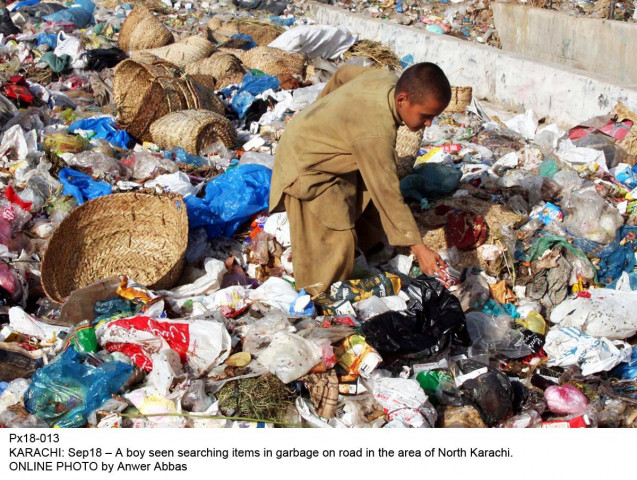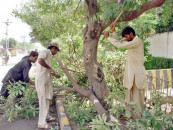Debate on how best to handle waste
Representatives of civic agencies make tall claims of collecting, disposing of garbage

PHOTO: FILE
While IMC Director Sanitation Sardar Khan Zimri said the corporation was lifting over 500 tonnes of garbage daily from the capital, RWMC Operational Head Mohammad Hussnain claimed the company was disposing of 94% waste generated in the garrison city, though these statements have yet to be independently verified.
Regarding a long delayed issue, Zimri said IMC has finalised the site for the first-ever properly engineered sanitary landfill facility for the federal capital. A report has been submitted to the government for further necessary actions for developing the landfill site which will help resolve the issue of waste disposal, he said during a seminar titled “Clean and Green Pakistan: Reforming the Waste Management Sector,” organised by the Sustainable Development Policy Institute (SDPI).
Zimri said that to meet the financial challenges, IMC has decided to impose sanitation charges against the collection of garbage at the door-steps and suggestions from citizens of the capital are welcome in this regard. He expressed dissatisfaction over the behaviour of the citizen and urged them to be responsible in order to keep their surroundings clean. Every day, around 550-600 tonnes of waste was produced in the capital and IMC collects all the waste on a daily basis, he added.
Hurdles upon hurdles: Sindh struggles to pass solid waste
Hussnain said that Rawalpindi city produces around 830 tonnes of waste every day. RWMC was efficiently collecting and disposing of 94% of the waste produced in Rawalpindi with obsolete equipment and limited workforce. He said that RWMC is working on the vision of zero landfill waste and for that RWMC is working on materialising a proper engineered sanitary landfill facility for Rawalpindi city.
SDPI Head Climate Change Unit Dr Imran S Khalid stated that a proper waste management system was non-existent in Pakistani cities. This leads to open dumping of solid and hazardous waste which were a threat to human health. Moreover, the open burning of waste contributes to the growing menace of air pollution. He emphasised the need for municipalities to work with civil society and the private sector to develop effective and sustainable mechanisms for properly dealing with our growing waste problem.
Solid Waste Association of Pakistan (SWAP) President Jamil Asghar Bhatti said that when the capital city was being planned, a proper waste landfill site for the city was ignored which led to current chaotic situation. He said that a comprehensive and integrated solid waste management cycle has six steps including primary collection, transportation, recycling, disposal, motivation and organisation.
Sumaira Gul, CEO, Akhtar Hameed Khan Memorial Trust said that if the private sector, particularly, social entrepreneurs engaged and facilitated, 22 industries, which are associated with solid waste, can help thrive and create employment opportunities.
Zoone Hasan Sultan, Environment Programme Lead, Pak Mission Society emphasised the need for rehabilitation of the environment for a better healthy life through improved solid waste management practices. Hassaan Sipra, Climate and Environmental Researcher COMSATS University stressed upon IMC and CDA to engage with schools and universities to help raise awareness and change societal behaviour.
Published in The Express Tribune, March 5th, 2020.


















COMMENTS
Comments are moderated and generally will be posted if they are on-topic and not abusive.
For more information, please see our Comments FAQ